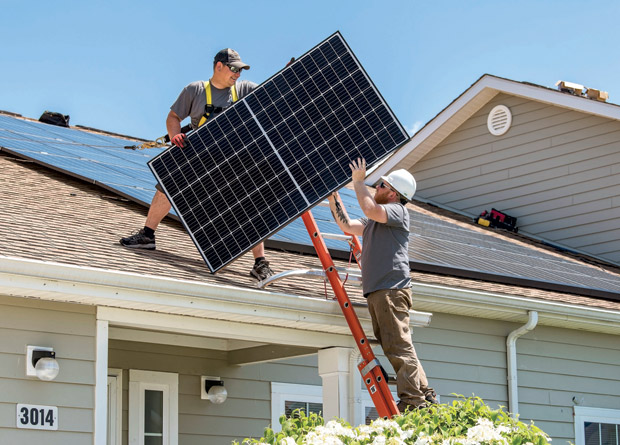Simple steps to getting started with solar panels
 Managing work-life balance as a parent comes with challenges, and with busy schedules for both parents and children, disruptions at the last minute can really take a toll on a family’s everyday routine. This is especially true when a child has to take a sick day from school due to illness during cold and flu season.
Managing work-life balance as a parent comes with challenges, and with busy schedules for both parents and children, disruptions at the last minute can really take a toll on a family’s everyday routine. This is especially true when a child has to take a sick day from school due to illness during cold and flu season.
With more Americans “going green” than ever before, you’ve probably already started thinking about doing it yourself. Perhaps you’ve increased your recycling efforts, started using more Energy Star appliances and light bulbs or upgraded to other greener technology options. Chances are, you also may be thinking about using solar energy to power your home, but don’t know where to start.
It may be easier than you think to have solar panels installed in your home. According to residential solar experts, here are the steps involved in going solar.
1. Check your roof.
Because putting solar panels on your home involves a roof installation, your first step should be checking the condition of your roof to see if you may need any repairs or if you must replace your roof before installation. Having a solid foundation for solar panels is crucial to avoid problems down the road. The usable life of most solar equipment exceeds 20 years, so proactively making repairs on roofs near end of life can save headaches of repairing or replacing rooftops once the solar array is installed.
2. Gather information.
Research different solar module technology types and warranties. To the untrained eye most solar modules look alike, but there are differences in the cells (the engine of the solar modules) that impact efficiency. Depending on your home’s energy usage and the available space you have to install the panels (ideally on an unshaded south or southwest facing roof), this may influence whether you need high efficiency solar panels. Also research not just upfront installation costs, but the value of the energy produced by the array during the life of the system. Saving 5 percent on installation costs today might reduce savings by 10 percent or more over the lifetime of your solar installation.
3. Find an installer.
Research reputable companies in your area so you’ll be confident that your installation is done correctly. Be wary of sales-people who show up at your door trying to persuade you to make an instant decision. Reputable installation companies will be registered with organizations such as the Better Business Bureau, have credentials from third party organizations like NABCEP (North American Board of Certified Energy Practitioners), or are certified installer partners of the manufacturers they represent. Get installation quotes from a few companies so you can compare costs. An installer will want to visit your home to assess the state and orientation of your roof and to see how much shade it gets. The installation company will also recommend solar and energy storage products, based on your budget and needs.
4. Choose your solar panels.
Look for efficient, durable solar panels from a company you already know and trust. LG NeON 2 solar panels with Cello Technology have a double-sided solar cell structure, enabling them to capture light and generate energy from both the front and back. When the angle of light is lower during mornings and evenings times homeowners are most likely to be home LG NeON 2 solar panels will generate more energy than others that only capture light from the front. These solar panels provide the highest possible value for budget-conscious customers and are backed by an industry leading 25-year product and performance warranty. High-quality solar panels like these are low maintenance and have a very low failure rate.
5. Arrange installation.
Most solar installations take from one to three days, depending on your situation. Your installation company will ensure that electrical wiring is installed to connect the general power system to your electrical panel and will prepare your roof so that racking may be attached. Once the panels are set in place, inverters are then connected to the panels. Your solar panel installation may need to be inspected by your local government as well as your electrical company, to be sure that everything is correctly wired and installed to meet electrical codes and ensure the safety of the installation. Once the inspections are completed (which can take longer depending on your area), your solar system can go live.
Having solar panels installed may seem like a huge undertaking, but in reality it will be well worth it in terms of the cost savings on your household electricity bills and the positive impact it will have on the environment and will increase the value of your home. A 2019 study by Zillow shows that homes with solar sell on average 4.1 percent higher than homes without on-site solar. A Federal Investment Tax Credit that provides a 30 percent credit off the installed cost of solar is set to begin declining at the end of 2019, making now the best time to evaluate going solar.
Make sure you choose an installation company and solar products that are high quality from a brand you trust, and your project will be successful.
This article is courtesy of Brand-point.